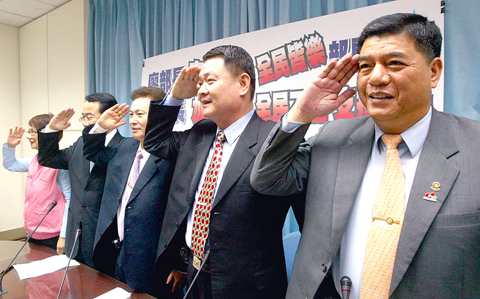Premier Liu Chao-shiuan (劉兆玄) yesterday voiced support for Minister of the Interior Liao Liou-yi (廖了以), calling him a responsible official.
Liao fought back tears at a press conference on Tuesday night when answering questions over reports that an estimated NT$11 million (US$327,000) in consumer vouchers had gone missing at distribution centers on Sunday.
Discrepancies were discovered after an inventory of uncollected vouchers was completed on Sunday night. The exact amount of vouchers unaccounted for has not been announced.

PHOTO: LIN CHENG-KUNG, TAIPEI TIMES
Liao said he would take full responsibility for any mistakes and would resign if the public was dissatisfied. He also said he was willing to foot the bill for any lost vouchers not covered by insurance.
Liu said yesterday the government had distributed more than 90 percent of the NT$85.7 billion in vouchers on Sunday and hoped the minister would not be too hard on himself.
Meanwhile, Chinese Nationalist Party (KMT) Legislator Lo Shu-lei (羅淑蕾) said Liao should not have to resign over a relatively small mistake.
Lo said the government should make up for any losses not covered by insurance it took out for the voucher program, but added that if Liao insisted on paying the sum out of his own pocket, she and some of her colleagues would contribute from their salaries.
Ho Li-tai (何禮臺), chief of Sincheng Township (新城) in Hualien County, also expressed his support for Liao and for the government’s voucher program.
He said he was willing to pay a possible loss of more than NT$10,000 in his township with his own money.
The ministry has said it would make the exact number of missing vouchers public on Friday once tallies were complete.
The ministry tasked local governments with handing out NT$3,600 in vouchers to all eligible citizens and residents at 14,202 distribution stations.
More than 91 percent of people eligible for the vouchers picked them up on Sunday, collecting a total of NT$76.2 billion.
Meanwhile, opposition lawmakers were divided over Liao’s offer to cover the losses.
“I admire him for wanting to shoulder responsibility,” Democratic Progressive Party (DPP) Legislator Huang Wei-che (黃偉哲) told the Taipei Times. “But I think distinguishing what’s right and what’s wrong is at the core of this issue.”
He said he believed that “whoever does right should be rewarded and whoever does wrong should be punished.”
“There were more than 10,000 [distribution] centers countrywide, but only a handful of centers had problems,” Huang said. “How is it fair for the minister — rather than those who made the mistakes — to shoulder the responsibility?”
DPP Legislator Hsueh Ling (薛凌), a member of the legislature’s Internal Administration Committee responsible for monitoring the Ministry of the Interior, supported Liao’s offer.
“I respect the minister for what he has decided,” Hsueh said. “Although he wasn’t personally responsible for the errors, he should still be held accountable for mistakes made by the people who work for him.”
Chen Chieh-ju (陳節如), another DPP lawmaker and long-time social welfare activist, expressed discontent with Liao’s policies.
“The Ministry of the Interior has become the ‘ministry of handing out money.’ The idea behind issuing consumer vouchers is just like other welfare policies he has implemented before,” Chen said. “If he thinks he should be responsible for handing out money carelessly [and step down], he can go right ahead.”

Several Chinese Nationalist Party (KMT) officials including Chairman Eric Chu (朱立倫) are to be summoned for questioning and then transferred to prosecutors for holding an illegal assembly in Taipei last night, the Taipei Police said today. Chu and two others hosted an illegal assembly and are to be requested to explain their actions, the Taipei City Police Department's Zhongzheng (中正) First Precinct said, referring to a protest held after Huang Lu Chin-ju (黃呂錦茹), KMT Taipei's chapter director, and several other KMT staffers were questioned for alleged signature forgery in recall petitions against Democratic Progressive Party (DPP) legislators. Taipei prosecutors had filed

Taiwan would welcome the return of Honduras as a diplomatic ally if its next president decides to make such a move, Minister of Foreign Affairs Lin Chia-lung (林佳龍) said yesterday. “Of course, we would welcome Honduras if they want to restore diplomatic ties with Taiwan after their elections,” Lin said at a meeting of the legislature’s Foreign Affairs and National Defense Committee, when asked to comment on statements made by two of the three Honduran presidential candidates during the presidential campaign in the Central American country. Taiwan is paying close attention to the region as a whole in the wake of a

NEW WORLD: Taiwan is pursuing innovative approaches to international relations through economics, trade and values-based diplomacy, the foreign minister said Taiwan would implement a “three-chain strategy” that promotes democratic values in response to US tariffs, Minister of Foreign Affairs Lin Chia-lung (林佳龍) said. Taiwan would aim to create a “global democratic value chain,” seek to capitalize on its position within the first island chain and promote a “non-red supply chain,” Lin was quoted as saying in the ministry’s written report to the Legislative Yuan submitted ahead of the legislature’s Foreign Affairs and National Defense Committee meeting slated for today. The Ministry would also uphold a spirit of mutual beneficial collaboration, maintaining close communication and consultations with Washington to show that Taiwan-US cooperation

Taiwan and the US have begun trade negotiations over tariffs imposed by US President Donald Trump earlier this month, Minister of Foreign Affairs Lin Chia-lung (林佳龍) said in an interview this morning before reporting to the Legislative Yuan’s Foreign Affairs and National Defense Committee. The Taipei Economic and Cultural Representative Office (TECRO), Taiwan’s de facto embassy in the US, has already established communication channels with the US Department of State and the US Trade Representative (USTR), and is engaging in intensive consultations, he said. Points of negotiation include tariffs, non-tariff trade barriers and issues related to investment, procurement and export controls, he